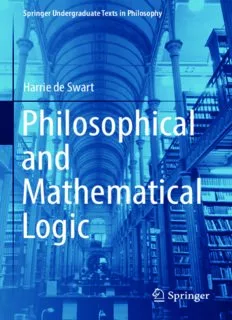
Philosophical and Mathematical Logic PDF
Preview Philosophical and Mathematical Logic
Springer Undergraduate Texts in Philosophy Harrie de Swart Philosophical and Mathematical Logic Springer Undergraduate Texts in Philosophy The Springer Undergraduate Texts in Philosophy offers a series of self-contained textbooksaimedtowardstheundergraduatelevelthatcoversallareasofphilosophy rangingfromclassicalphilosophytocontemporarytopicsinthefield.Thetextswill includeteachingaids(suchasexercisesandsummaries)andwillbeaimedmainly towardsmoreadvancedundergraduatestudentsofphilosophy. Theseriespublishes: • Allofthephilosophicaltraditions • Introduction books with a focus on including introduction books for specific topicssuchaslogic,epistemology,Germanphilosophyetc. • Interdisciplinaryintroductions–wherephilosophyoverlapswithotherscientific orpracticalareas Thisseriescoverstextbooksforallundergraduatelevelsinphilosophyparticu- larlythoseinterestedinintroductionstospecificphilosophytopics. We aim to make a first decision within 1 month of submission. In case of a positivefirst decisionthe workwillbeprovisionally contracted:the finaldecision aboutpublicationwilldependupontheresultoftheanonymouspeerreviewofthe complete manuscript. We aim to have the complete work peer-reviewed within 3 monthsofsubmission. Proposalsshouldinclude: • Ashortsynopsisoftheworkortheintroductionchapter • TheproposedTableofContents • CVoftheleadauthor(s) • Listofcoursesforpossiblecourseadoption The series discourages the submission of manuscripts that are below 65,000 wordsinlength. For inquiries and submissions of proposals, authors can contact Ties.Nijssen@ Springer.com More information about this series at http://www.springer.com/series/13798 Harrie de Swart Philosophical and Mathematical Logic Harrie de Swart Faculty of Philosophy Erasmus University Rotterdam Rotterdam, The Netherlands Department of Philosophy Tilburg University Tilburg, The Netherlands ISSN 2569-8737 ISSN 2569-8753 (electronic) Springer Undergraduate Texts in Philosophy ISBN 978-3-030-03253-1 ISBN 978-3-030-03255-5 (eBook) https://doi.org/10.1007/978-3-030-03255-5 Library of Congress Control Number: 2018960381 © Springer Nature Switzerland AG 2018 This work is subject to copyright. All rights are reserved by the Publisher, whether the whole or part of the material is concerned, specifically the rights of translation, reprinting, reuse of illustrations, recitation, broadcasting, reproduction on microfilms or in any other physical way, and transmission or information storage and retrieval, electronic adaptation, computer software, or by similar or dissimilar methodology now known or hereafter developed. The use of general descriptive names, registered names, trademarks, service marks, etc. in this publication does not imply, even in the absence of a specific statement, that such names are exempt from the relevant protective laws and regulations and therefore free for general use. The publisher, the authors and the editors are safe to assume that the advice and information in this book are believed to be true and accurate at the date of publication. Neither the publisher nor the authors or the editors give a warranty, express or implied, with respect to the material contained herein or for any errors or omissions that may have been made. The publisher remains neutral with regard to jurisdictional claims in published maps and institutional affiliations. This Springer imprint is published by the registered company Springer Nature Switzerland AG The registered company address is: Gewerbestrasse 11, 6330 Cham, Switzerland Logicistoimprovehumanthinkinginordertoimprovehumanexistence. [AndrzejGrzegorczyk] However,thissame[mathematical]formofthinking,thissamekindofconceptanal- ysis,isalsoapplicabletomanyotherareasthataredirectlyrelatedtotheimmediate realityofourdailylives.Andsuchabroaderapplicationofthemathematicalform ofthoughtseemstometobeofthehighestimportance.Afterall,theunparalleled development of the technique in a narrow sense, of the technical technique, one couldsay,isfollowedbyahardlylessimportantdevelopmentofthepsychological technique, of the advertising technique. propaganda technique, in short, of means toinfluencepeople.However,wehavefailedtostrengthenourdefenseequipment againstbeliefandsuggestionattemptsbyothersbyimprovingourthinkingtechnol- ogy.[...]Inthistangleofquestionsandshamquestionswecanfindaguideinthe conceptualanalysis,demonstratedinthemathematicalwayofthinking.Againstall these known and unknown psychic influences we can forge a weapon by improv- ingourthinkingtechnique.Andthatsuchareinforcementofourspiritisrequired, urgently needed, is my deepest conviction. [David van Dantzig, 1938, inaugural lecture,Delft,theNetherlands;translatedfromDutch] Thisbookisdedicated toJohanJ. deIongh (1915-1999) Myfriendandteacher viii It is the main task of a philosopher to show people that things do not have to be thewaytheyare,thattheymightbedifferentandthatinsomecasestheyshouldbe different.[JohandeIongh] Johan de Iongh (1915 - 1999) was a student of L.E.J. Brouwer (1881 - 1966), the foundingfatherofintuitionism.Hewasconvincedofthesoundnessoftheintuition- istic view of mathematics. He also had a great affinity with the signific position, representedbyGerritMannoury(1867-1956). He became professor in Nijmegen in 1961, where he was teaching the course on analysis for first-year students. Later de Iongh devoted most of his teaching to coursesonlogic,thefoundationsandthephilosophyofmathematics,andinparticu- larintuitionisticmathematics.Hewasverycarefulingivinganaccuratepresentation of Brouwer’s views. He took a great interest in the well-being of his students and founditimportanttoknowthempersonally. JohandeIonghwasasmuchaphilosopherasamathematician.HesharedPlato’s viewthatthestudyofmathematicsisthecorrectintroductiontophilosophy.Hehas published very little. His Platonic distrust towards the written word was great; his tendency to share his thoughts and ideas with friends, rather than to write them down,muchgreater.Yetsometextsfromhimhavebeenpreserved,andmanyofhis ideashavebeenworkedoutinPh.D.thesesandpapersbyhisstudents. His broad scholarship was impressive. He read Greek and Latin authors in the original.Hisinterestinsciencereachedfarbeyondmathematicsandhewaswidely readinworldliterature. He was a convinced Catholic and his thinking on mathematics and philosophy has developed in continuing discussion with St Augustine, St. Thomas Aquinas, St.ThomasMoreandNicholasofCusa.Healwaysstartedhislectureswithashort prayerinLatin:Spiritussanctigratiailluminetsensusetcordanostra[Maythegrace of the Holy Spirit illuminate our senses and our hearts]. And he always finished his lectures with the following prayer: Gratias tibi agimus, Domine, pro omnibus beneficiistuis[Wethankyou,myLord,forallyourblessings]. Itwasaprivilegetobehisstudent,hisPhDstudent,hisassistantandhisfriend. Foreword The following quotation is from Lewis Carroll, Symbolic Logic and The Game of Logic;Introduction. Thelearner,whowishestotrythequestionfairly,whetherthislittlebookdoes,ordoes not,supplythematerialsforamostinterestingrecreation,isearnestlyadvisedtoadoptthe followingRules: (1)Beginatthebeginning,anddonotallowyourselftogratifyamereidlecuriosityby dippingintothebook,hereandthere.Thiswouldverylikelyleadtoyourthrowingitaside, withtheremark‘Thisismuchtoohardforme!’,andthuslosingthechanceofaddinga verylargeitemtoyourstockofmentaldelights....Youwillfindthelatterparthopelessly unintelligible,ifyoureaditbeforereachingitinregularcourse. (2) Don’t begin any fresh Chapter, or Section, until you are certain that you thoroughly understandthewholebookuptothatpoint,andthatyouhaveworked,correctly,mostif notalloftheexampleswhichhavebeenset.Solongasyouareconsciousthatalltheland you have passed through is absolutely conquered, and that you are leaving no unsolved difficultiesbehindyou,whichwillbesuretoturnupagainlateron,yourtriumphalprogress willbeeasyanddelightful.Otherwise,youwillfindyourstateofpuzzlementgetworseand worseasyouproceed,tillyougiveupthewholethinginutterdisgust. (3)Whenyoucometoanypassageyoudon’tunderstand,readitagain:ifyoustilldon’t understandit,readitagain:ifyoufail,evenafterthreereadings,verylikelyyourbrainis gettingalittletired.Inthatcase,putthebookaway,andtaketootheroccupations,andnext day,whenyoucometoitfresh,youwillverylikelyfindthatitisquiteeasy. (4)Ifpossible,findsomegenialfriend,whowillreadthebookalongwithyou,andwilltalk overthedifficultieswithyou.Talkingisawonderfulsmoother-overofdifficulties.WhenI comeuponanything-inLogicorinanyotherhardsubject-thatentirelypuzzlesme,Ifind itacapitalplantotalkitover,aloud,evenwhenIamallalone.Onecanexplainthingsso clearlytoone’sself!Andthen,youknow,oneissopatientwithone’sself:onenevergets irritatedatone’sownstupidity! If,dearReader,youwillfaithfullyobservetheseRules,andsogivemylittlebookareally fairtrial,Ipromiseyou,mostconfidently,thatyouwillfindSymbolicLogictobeoneof themost,ifnotthemost,fascinatingofmentalrecreations! ... Mentalrecreationisathingthatweallofusneedforourmentalhealth;andyoumayget muchhealthyenjoyment,nodoubt,fromGames,suchasBack-gammon,Chess,andthe newGame‘Halma’.Butafterall,whenyouhavemadeyourselfafirst-rateplayeratany ix x Foreword oneoftheseGames,youhavenothingrealtoshowforit,asaresult!YouenjoyedtheGame, andthevictory,nodoubt,atthetime;butyouhavenoresultthatyoucantreasureupand getrealgoodoutof.And,allthewhile,youhavebeenleavingunexploredaperfectmineof wealth.OncemasterthemachineryofSymbolicLogic,andyouhaveamentaloccupation alwaysathand,ofabsorbinginterest,andonethatwillbeofrealusetoyouinanysubject youmaytakeup.Itwillgiveyouclearnessofthought-theabilitytoseeyourwaythrough apuzzle-thehabitofarrangingyourideasinanorderlyandget-at-ableform-and,more valuable than all, the power to detect fallacies, and to tear to pieces the flimsy illogical arguments,whichyouwillsocontinuallyencounterinbooks,innewspapers,inspeeches, andeveninsermons,andwhichsoeasilydeludethosewhohavenevertakenthetroubleto masterthisfascinatingArt.Tryit.ThatisallIaskofyou! [FromLewisCarroll,SymbolicLogicandTheGameofLogic.Introduction;Dover Publications,Mineola,NY,1958.]
Description: